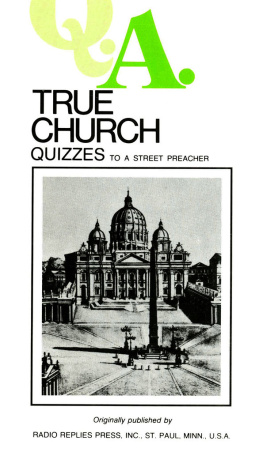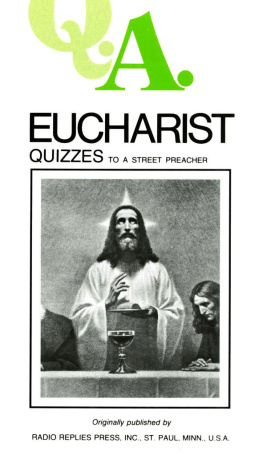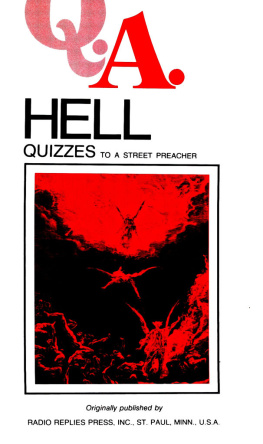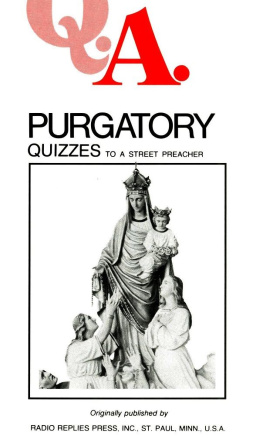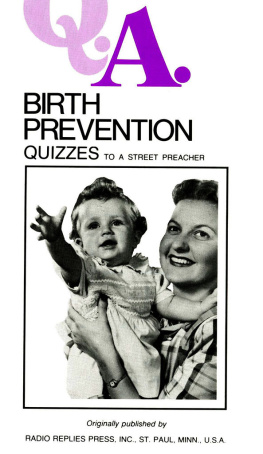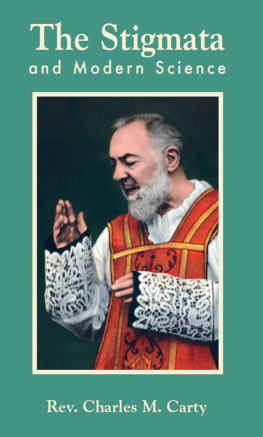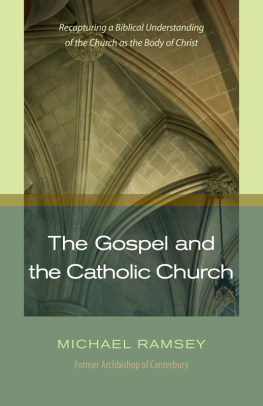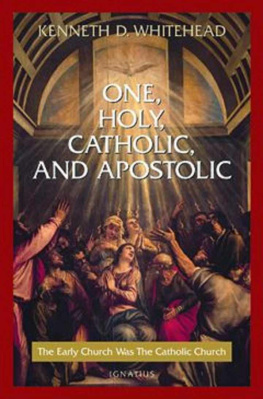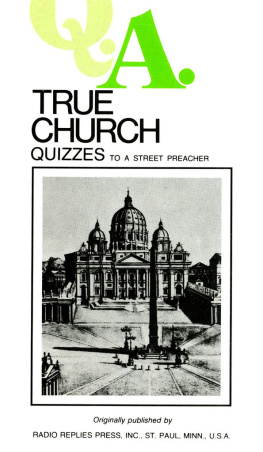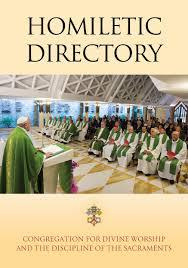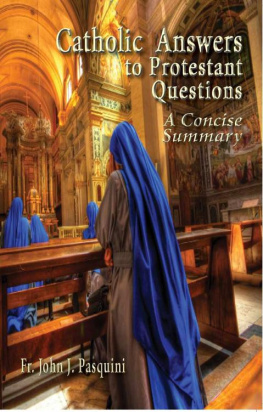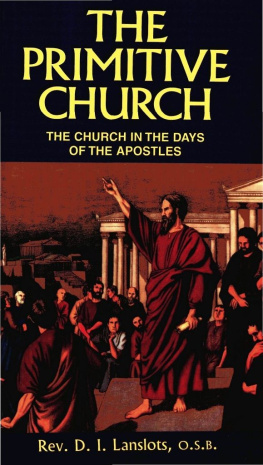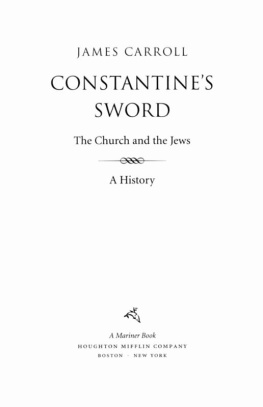Charles Mortimer Carty - True Church Quizzes to a Street Preacher
Here you can read online Charles Mortimer Carty - True Church Quizzes to a Street Preacher full text of the book (entire story) in english for free. Download pdf and epub, get meaning, cover and reviews about this ebook. year: 1992, publisher: TAN Books, genre: Religion. Description of the work, (preface) as well as reviews are available. Best literature library LitArk.com created for fans of good reading and offers a wide selection of genres:
Romance novel
Science fiction
Adventure
Detective
Science
History
Home and family
Prose
Art
Politics
Computer
Non-fiction
Religion
Business
Children
Humor
Choose a favorite category and find really read worthwhile books. Enjoy immersion in the world of imagination, feel the emotions of the characters or learn something new for yourself, make an fascinating discovery.
- Book:True Church Quizzes to a Street Preacher
- Author:
- Publisher:TAN Books
- Genre:
- Year:1992
- Rating:5 / 5
- Favourites:Add to favourites
- Your mark:
- 100
- 1
- 2
- 3
- 4
- 5
True Church Quizzes to a Street Preacher: summary, description and annotation
We offer to read an annotation, description, summary or preface (depends on what the author of the book "True Church Quizzes to a Street Preacher" wrote himself). If you haven't found the necessary information about the book — write in the comments, we will try to find it.
Charles Mortimer Carty: author's other books
Who wrote True Church Quizzes to a Street Preacher? Find out the surname, the name of the author of the book and a list of all author's works by series.
True Church Quizzes to a Street Preacher — read online for free the complete book (whole text) full work
Below is the text of the book, divided by pages. System saving the place of the last page read, allows you to conveniently read the book "True Church Quizzes to a Street Preacher" online for free, without having to search again every time where you left off. Put a bookmark, and you can go to the page where you finished reading at any time.
Font size:
Interval:
Bookmark:
True Church Quizzes
to a Street Preacher
FT. Chas. M. Carty
&
Rev. Dr. L. Rumble, M.S.C.
Archiepiscopus Sancti Pauli.
Written by
FT . Chas. M. Carty
&
Rev. Dr. L. Rumble, M.S.C.
Copyright 1976 by TAN Books
Originally published by
Fathers Rumble and Carty
Radio Replies Press, Inc.
St. Paul, Minn., U.S.A.
Complete and Unabridged
TAN Books
Charlotte, North Carolina
www.TANBooks.com
1976
CONTENTS
TRUE CHURCH QUIZZES TO A STREET PREACHER
1. What is the Catholic idea of the Church of Christ?
The Church is that visible society of men upon earth which was founded by Jesus Christ, guaranteed by Him to exist all days until the end of the world, and sent by Him to teach all nations with His own authority. It is one definite society for man's spiritual good, and its members are bound together by the profession of the same and complete Christian faith, by the same Sacraments and worship, and by submission to the same spiritual authority vested in the successors of St. Peterthe present successor being the Bishop of Rome.
2. When did the Church established by Christ get the name Catholic?
Christ left the adoption of a name for His Church to those whom He commissioned to teach all nations. Christ called the spiritual society He established, "My Church" (Mt. xvi, 18), "the Church" (Mt. xviii, 17). In order to have a distinction between the Church and the Synagogue and to have a distinguishing name from those embracing Judaic and Gnostic errors we find St. Ignatius (50-107 A.D.) using the Greek word "Katholicos" (universal) to describe the universality of the Church established by Christ. St. Ignatius was appointed Bishop of Antioch by St. Peter, the Bishop of Rome. It is in his writings that we find the word Catholic used for the first time. St. Augustine, when speaking about the Church of Christ, calls it the Catholic Church 240 times in his writings.
3. What positive proof have you that the Catholic Church is the only true Church?
The proof lies in the fact that the Catholic Church alone corresponds exactly to the exact religion established by Christ. Now the Christian religion is that religion which
(a) Was founded by Christ personally;
(b) Has existed continuously since the time of Christ;
(c) Is Catholic or universal, in accordance with Christ's command to go to all the world and teach all nations;
(d) Demands that all her members admit the same doctrine;
(e) Exercises divine authority over her subjects, since Christ said that if a man would not hear the Church he would be as the heathen.
Now the Catholic Church alone can claim
(a) To have been founded by Christ personally. All other Churches disappear as you go back through history. Christ said, "Thou art Peter, and upon this rock I will build My Church." Matt. XVI, 18. There are many claimants to the honor of being Christ's Church. But among all non-Catholic Churches, we find one built on a John Wesley; another on a Martin Luther; another on a Mrs. Eddy, etc. But the Catholic Church alone can possibly claim to have been built on Peter, the chief of the Apostles, and one-time Bishop of Rome.
(b) To have existed in all the centuries since Christ.
(c) That every one of her members admits exactly the same essential doctrines.
(d) To be Catholic or universal.
(e) To speak with a voice of true authority in the name of God.
4. Where in Scripture does it mention that Christ founded any such system?
In general, Christ terms His Church a kingdom, which supposes some organized authority. However the explicit steps in the establishing of an authoritative hierarchy are clear. Christ chose certain special men. "You have not chosen Me: but I have chosen you." Jn. XV., 16. He gave them His own mission. "As the Father hath sent Me, I also send you." Jn. XX., 21. This commission included His teaching authority: "Teach all nations... whatsoever I have commanded you." Matt. XXVIII, 19-20; His power to sanctify"Baptising them," Matt. XXVIII., 19forgiving sin, "Whose sins you shall forgive, they are forgiven," Jn. XX., 23offering sacrifice, "Do this for a commemoration of Me." 1 Cor. XI., 24; His legislative or disciplinary power"He who hears you, hears Me, and he who despises you despises Me," Lk. X., 16; "Whatsoever you shall bind on earth, shall be bound also in Heaven," Matt. XVIII., 18. "If a man will not hear the Church, let him be to thee as the heathen," Matt. XVIII., 17. The Apostles certainly exercised these powers from the beginning. Thus we read in the Acts of the Apostles, "They were all persevering in the doctrine of the Apostles," II., 42. St. Paul himself did not hesitate to excommunicate the incestuous Corinthian. 1 Cor. V, 3-5. And he wrote to the Hebrews, "Obey your prelates, and be subject to them." Heb. XIIII., 17.
5. Cannot the Congregationalist make out an equally strong case for a universal Spiritual Brotherhood, but with local independence of churches?
There is no evidence of independent local churches in Scripture, nor in primitive documents. There is evidence that there were distinct groups of Christians in various places, just as there are Catholics in New York under one Bishop, and Catholics in London under another. All true Christians certainly formed a universal spiritual brotherhood, as Catholics do today; but local autonomy existed only in the sense that there were Bishops in charge of various localities, the Bishops themselves being subject to St. Peter, and after his death, to the successor of St. Peter.
6. Whilst I walk in the Spirit, I do not think it necessary to be subject to any visible organization.
You may say that you believe it unnecessary. But pay attention to the words of Christ I have just quoted. He thought it necessary, and He has the right to map out the kind of religion we accept. If Christians had to accept such disciplinary authority in the time of the Apostles, they must accept it now. Christianity is Christianity. It does not change with the ages. If it did, it would lose its character, and not remain the religion of Christ, to which religion alone He attached His promises. And remember His prediction that His flock would be one fold with one shepherd. Jn. X, 14-16. You would have sheep, not gathered into one fold, but straying anywhere and everywhere, having no shepherd with any real authority over them.
7. Why do you reserve the Hierarchical authority to men? Why not give women a chance?
Nowhere did Christ ever commission women to teach in His name and with His authority. St. Paul explicitly forbids women to attempt to exercise such functions. People who would ordain women in the Church seem to believe that they know more about Christianity than St. Paul. 1 Cor. XIV, 34-35, says: "Let women keep silence in the churches; for it is not permitted them to speak, but to be subject, as also the law saith. But if they would learn anything, let them ask their husbands at home. For it is a shame for a woman to speak in the Church." America is today a marvelous example of how people obey the Bible. 1 Tim. II, 11-12 says, "Let the women learn in silence, with all subjection. But I suffer not a woman to teach, nor to use authority over the man; but to be in silence."
8. Protestant principles demand that the Catholic Church is wrong.
They must say that the Catholic Church is wrong or else why are they Protestants? Yet they must also admit that not one of their denominations has any right to declare itself to be the one True Church. And that, for the simple reason that Christ did not establish any institution which could be known by men to be His Church.
9. You Catholics claim to see what cannot be seen.
We Catholics claim that Christ did establish a visible and discoverable Church. You Protestants do not deny that Christ established a church of some kind. But you must deny that the Catholic Church is the True Church prior to the Reformation, or there could be no excuse for setting up the Protestant Churches. Yet, since these Protestant Churches did not exist prior to the Reformation, where was the True Church then? There is but one way out. It was there invisible! And it is here today invisible.
Next pageFont size:
Interval:
Bookmark:
Similar books «True Church Quizzes to a Street Preacher»
Look at similar books to True Church Quizzes to a Street Preacher. We have selected literature similar in name and meaning in the hope of providing readers with more options to find new, interesting, not yet read works.
Discussion, reviews of the book True Church Quizzes to a Street Preacher and just readers' own opinions. Leave your comments, write what you think about the work, its meaning or the main characters. Specify what exactly you liked and what you didn't like, and why you think so.

